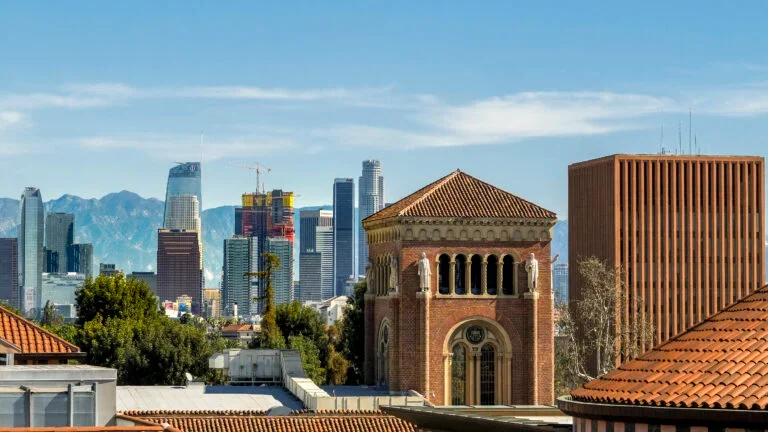Faculty with openings for new students for Fall 2026 admission
The following clinical faculty are interested in recruiting students for Fall 2026 admission:
Drs. Stan Huey, Katharina Kircanski, Darby Saxbe, and Emilio Valadez
The following clinical faculty may be interested in recruiting students for Fall 2026 admission but have not yet made the determination to do so:
Drs. Chris Beam, and Jon Stange
The following core clinical faculty are not planning to admit students for Fall 2026 admission: Brittany Beasley, Gerald Davison, Iony Ezawa, Duke Han, Bruna Martins-Klein, and Lauren Shapiro.

Fall 2026 Clinical Science Application
The priority deadline for clinical program applicants is November 10th, 2025 and the clinical area will begin reviewing applications at that time. Final Deadline is December 1st, 2025. We are not currently planning to require GRE scores from applicants.

Clinical Program Student Data
We provide these data in an effort to help applicants make informed decisions about graduate training programs and to comply with recommendations of the American Psychological Association Commission on Accreditation, the Psychological Clinical Science Accreditation System (PCSAS) accreditation principles, and the Council of University Directors of Clinical Psychology (CUDCP). CUDCP provides a list of full disclosure websites of member programs. APA also provides a list of accredited doctoral programs*. PCSAS accredited programs can be found here.
Successful outcomes in our program are exemplified by the achievements of our current students and by the graduates of the program. We continuously monitor our program’s success in preparing students to do publishable research and to take research-related positions or other positions toward the goal of disseminating clinical science.
At the time of our recent PCSAS accreditation review, 69% of our graduates over the past 10 years met the criteria of producing and/or disseminating clinical science. Of all graduates, 28% have tenure-track positions at universities and colleges; graduates also produce and disseminate clinical science through research post-doctoral positions and other non-academic research positions, through teaching and supervision, and through positions of leadership in which clinical science training informs decision-making and public policy. On average, our graduates publish 1.3 articles per year post-Ph.D.; 37.5 have been PI or Co-I on major grants, and the vast majority conducts research and does work with underserved populations. The progress and productivity of our current students is another key indicator of the quality of our program. By the time students leave for an internship, virtually all students have published, with the average number of publications exceeding 4. Data from students show an upward progression in the mean number of publications with each year (.6 in the first year, 1.6 in the second year, 1.8 in 3rd year, 2.2 in 4th year, 4.5 in the fifth year, and beyond). A number of our current students also hold prestigious pre-doctoral awards, including NIH NRSA Fellowships, NSF Predoctoral Fellowships, and the APA Minority Fellowship.
The clinical psychology program at USC has been accredited by the American Psychological Association since 1948. Our next site review will occur in 2027.
69%
graduates have met the criteria of producing and/or disseminating clinical science
28%
graduates have tenure-track positions at universities and colleges
37.5%
graduates have been PI or Co-I on major grants
Clinical Program Details and Information
Here, we’ve gathered essential information for individuals eager to pursue a degree in clinical science at the University of Southern California, covering key aspects, you’ll find the answers you need as you prepare for this application cycle.
-
Admission to USC is competitive. We favor applicants who demonstrate strong potential for research careers through their academic record (indicated by choice of course work and GPA), have considerable experience conducting research, have strong letters of endorsement from faculty who have known them well, and who express career goals consistent with our own model and mission to train clinical scientists. We also consider a research match – whether an applicant’s research interests are a good fit given the research interests of faculty in the clinical area. The entire record contributes to the admissions decision.
-
View data here: Program Disclosures
-
All students in the 2025 entering class have been offered five years of funding, including two years of fellowship. The remaining years may consist of research assistantships, teaching assistantships, or paid clinical placements. These awards come with at least 12 units of tuition remission per semester. Students do not have to pay tuition as long as they are under the terms of their five-year package and in good standing. View data here: Program Costs
(Please note that these are estimated figures. Further information on standard fees assessed by USC can be found on the USC website: https://financialaid.usc.edu/graduates/prospective/how-much-wil-my-education-cost.html)
-
For the past ten completed academic years (students graduating August 2015 through August 2025), the average time to completion was 7 years including internship. Students entering the program with a master’s degree are not offered advanced standing in the program and must complete the same requirements. There is no change in expected time-to-completion based on the degree a student has at the time of entering the program. View data here: Time to Completition
-
In the table below, frequency (number) and percent of students obtaining internships are given. Percentage, in each case, is calculated by dividing the relevant number (such as the number obtaining an internship) by the total number of students who applied for an internship in that year. For each entry, the time interval refers to the year in which students applied for an internship (internship typically runs on a calendar similar to but not precisely overlapping an academic year). View data here: Internship Placement
-
Note: This information reflects program data as of August 2025. View data here: Attrition
-
In compliance with APA regulations, we provide the proportion seeking and obtaining licensure based on students graduating between 2015 and 2025. Some students enter the program intending careers in which licensure is not helpful (e.g., full-time academic research careers not involving any clinical supervision), and licensure laws vary from one state to another. In some states, it takes considerable time beyond the Ph.D. to accrue sufficient post-doctoral experience to obtain a license, so these numbers should be examined with that in mind. This statistic was last updated in August 2025. View data here: Licensure
Admission Statistics
Admission to USC is competitive. We favor applicants who demonstrate strong potential for research careers through their academic record (indicated by choice of course work and GPA), have experience conducting research at a high level of independence, have strong letters of endorsement from faculty who have known them well, express career goals consistent with our own model and mission to train clinical scientists. We also consider the research match – whether an applicant’s research interests are a good fit for a faculty mentor. The entire record contributes to the admissions decision.
Students are admitted to the clinical science program as a whole and are not directly admitted by individual faculty members. It is possible for students to work with more than one mentor over the course of their time at USC, although one faculty member is typically responsible for the primary research mentorship of each clinical student. There should be a close fit of research interest between the applicant and the potential research mentor
-
Applicant Data
Number of applicants
Number accepted for admission
Size of the incoming class
Number of incoming students receiving financial aid
2015-2016
411
9
6
6
2016-2017
369
9
5
5
2017-2018
357
7
3
3
2018-2019
424
13
9
9
2019-2020
375
10
3
3
2020-2021
440
11
6
6
2021-2022
697
9
5
5
2022-2023
546
10
8
8
2023-2024
534
12
8
8
2024-2025
590
9
5
5
Please note: Questions related to the program’s accredited status should be directed to the Commission on Accreditation: Office of Program Consultation and Accreditation, American Psychological Association, 750 1st Street, NE, Washington, DC 20002. Phone: (202) 336-5979 /E-mail: apaaccred@apa.org / Web: www.apa.org/ed/accreditation
*You can also find a list of APA’s list of accredited doctoral programs here.
